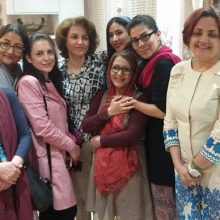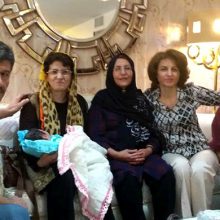Source: www.iran-emrooz.net
By Mohammad Arasi
Translation by Iran Press Watch
The meeting of Faezah Hashemi, Sajedeh Arabsorkhi, Jila Bani Yaghoub, Mahsa Amrabadi and Nasrin Sotoudeh with one of the leaders of the Iranian Baha’i community: Fariba Kamalabadi ‒ was a courageous act which has breathed new life into the democratic movement, religious pluralism, and the religious reform movement. It has started a new cycle in the struggle for religious pluralism and freedom of thought in Iran.
This historic movement, without a doubt, will play a decisive role in the establishment of liberty and the elimination of injustice against Baha’is.
Faezeh stressed: “Where does Islam say to treat Baha’is, reformists, and other groups this way? … This is cruelty … and injustice to these people (Baha’is) above all … I have not made a mistake that I should regret.” This act of this friendly meeting was not just an ordinary and straightforward meeting, but was the consequence of progressive ideas which profoundly contradicted the ideology and beliefs of the tyrants who govern our country. When she says: “I look at the cost of human rights … and we must pay,” first, she undermines the intellectual foundation of the authoritarian regime of the so-called “Guardianship of Islamic Jurists”, and raises the station of humanity above all its “religious truth” and its political and intellectual system.
Second, by this, she takes an independent stance against her father (Ali Akbar Hashemi Rafsanjani) and pours water into the chamber of scorpions, forcing them to emerge from their dark and stinking holes, perturbed in the light of day, running in any direction, spreading their venomous foul language.
The humanitarian stance of Faezeh was followed by the harsh reactions of thugs, speechmakers and the Supreme Leader’s mercenary jurists. This response raised the vital necessity to eliminate religious oppression against Baha’is and to establish ideological/religious freedom in Iran. More seriously, in truth, it has turned the matter into a national and civil issue.
In fact, Iranian hardliners have rushed forward and raised the issue about Baha’is in order to to pummel the Hashemi family, but it resulted in the opposite outcome; it has became a national and international focus, and it has aroused the curiosity of Iranians inside and outside of Iran. How well it is said: “In God’s hands intended evil becomes ultimate good.”
It has been said repeatedly, but it needs to be reiterated that the subject of oppression against the Baha’is of Iran is linked to all of our national and international concerns, and it has turned into a priority in Iranian democratization. This link means that this issue has a fundamental relationship with nation-building, reconciliation, national unity and national sovereignty in Iran; it is the focal point in the realization of human rights and the establishment of religious pluralism in Iran.
On one hand, this issue is considered part of the reformation and the reconciliation of Islam with the principles of democracy and the Universal Declaration of human rights. In international affairs, it has a fundamental linkage with the normalization of Iran’s relations with Europe and America and the departure of Iran from the global isolation. Finally, it is tightly interwoven with comprehensive national development and the enhancement of our international reputation…
This is because nation-building, development and national unity only take place when individual citizens ‒ regardless of their political affiliation, religious beliefs, ethnicity and gender ‒ enjoy the same civil and political rights. These shared rights mean constant progress in the direction of three types of equality: the equality of individuals in society, equality of the sexes, and equality of religions in society. In the same sense that the followers of any particular religion should not be granted special privileges just because they are a majority, so the rights of believers of any other religion should not diminish merely because they have a small number of followers.
In fact, a nation becomes unified when it has equal individual rights, civil and religious liberty. It develops a sense of fraternity, and enables ethnic, religious and gender definition to not be according to the criteria of followers of a specific religion ‒ Shi’ite Islam need not be used as the sole standard by which to judge other religions ‒ there need not be constant “demand & prohibition”.
When Ayatollah Ali Khamenei, the ruling Plenipotentiary of Iran, irresponsibly and prejudicially calls Baha’is “unclean”, and issues religious edicts to condemn them, how can we talk about a nation, about national unity, about solidarity and intimacy? How can we have rational and serene relations with Europe and the United States?
When you slaughter professors, doctors, engineers and entrepreneurs like Faramarz Samandari 1, Mahmoud Majzoub 2, Bozourg Alavian, Husayn Naji 3, Manuchehr Hakeem 4, Jinous Mahmoudi 5, Kourosh Talaei, Jahangir Hedayati 6 and hundreds of expert entrepreneurs whose works are still taught in universities, how can Iran create and achieve sustainable development?
For this reason, I consider that this meeting is historic and a landmark. It has pulled one of the important national and international issues of Iran out from its dark corners, and brought it to the open forum of society.
We must praise Faezeh, Sotoudeh, and Arabsorkhi, that with their exemplary wisdom and courage they have joined the issue of religious oppression against Baha’is, and have become dissidents in favor of the freedom of Iranian women. They have created certainty and hope, from which public freedom cannot be far off. For now, Iranian women have been the heralds of emancipation.
Yes: eternal Iran is condemned to freedom.
____
1. See http://www.iranrights.org/memorial/story/-3209/faramarz-samandari
2. See http://news.bahai.org/story/1076
3. See http://iranpresswatch.org/post/13119/ ‒ under the photo of the entire Spiritual Assembly
4. See http://www.iranpresswatch.org/post/1023
5. http://www.iranrights.org/memorial/story/-4018/jinus-nimat-mahmudi
6. See http://www.iranhrdc.org/english/english/publications/reports/3149-a-faith-denied-the-persecution-of-the-baha-is-of-iran.html?p=28 ‒ above note 229



Leave a Reply